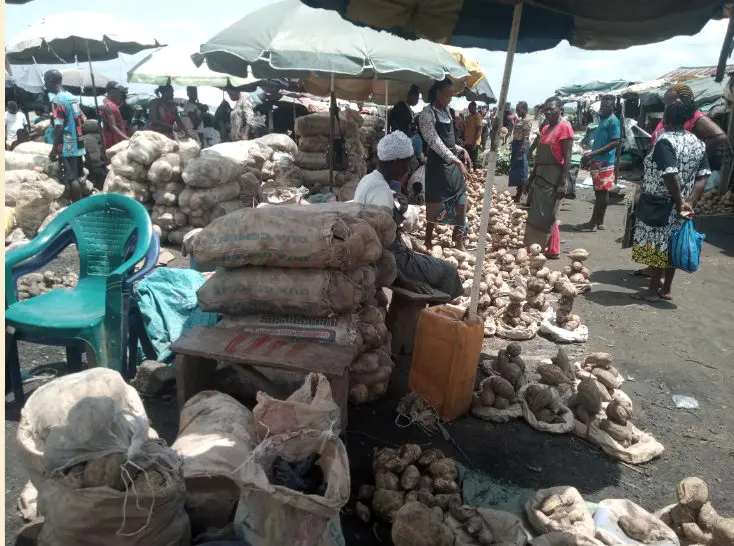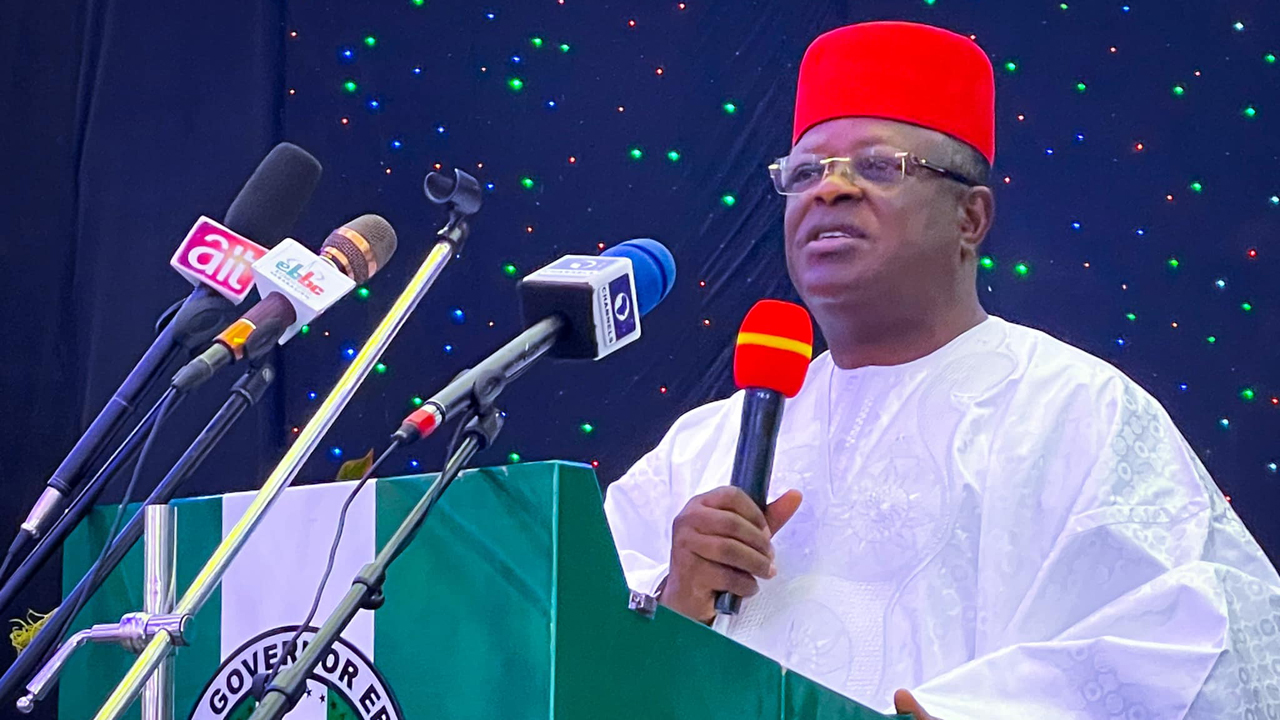Nigeria Breaking News
Mother protests as principal brutalises 14-year-old student

The mother of a Senior Secondary School student, Mrs. Becky Folorunso, has cried out for justice after the Principal of Pholex Private School, Ebute-Meta in Lagos, allegedly brutalized her son for not writing class notes.
In an interview with PUNCH Metro on Friday, Folorunso said that was not the first time her son, Adam, would be flogged in such a manner by the principal, Adewale Adetona.
Bruises suspected to be from whips could be seen on the boy’s back from pictures made available to our correspondent.
The troubled mother said while she had scolded her son and warned him to be writing his class notes, beating her child to that extent was uncalled for.
She called on relevant authorities of the Lagos State Government, particularly the State Universal Basic Education Board to intervene in the matter.
Folorunso said, “He is a playful son, but he is not a bad boy. He came home a few days ago and told me ‘Mummy, this beating is too much.’ He showed me his back and I saw bruises. But not like this very one. He said it was because he did not write one note. I scolded him and warned him to always write his notes.
“But when he came home on Thursday, May 25, he cried, ‘Mummy, I can’t take this any longer.’ When he removed his uniform and showed me his back, I was shocked and asked what happened to him. He said it was because he did not complete his Social Studies notes.”
She said her son told the principal to check well, but he wouldn’t listen to him. She said the principal began flogging the boy. “I heard he (the principal) said he knew me, but knowing me doesn’t mean he should kill my child,” the mother said.
Continuing, Folorunso recalled that she had been planning to withdraw the boy from the school following tales of alleged inhuman treatment being meted out to students before the incident.
“I didn’t know about all these stories before we registered him. How can they be running a private learning environment as if it is a public school where things like this go unpunished?” she queried.
When contacted, the school principal, Adetona, said he did not beat the child unjustly.
Speaking with our correspondent via a phone call on Friday, he said he was checking all the students’ notes to know some of them who were not writing up to date.
Adetona said, “I am a parent, I don’t beat unjustly. I know the mother very well. I noticed the boy doesn’t have a note at all. I just resumed the office (in the school) not quite long (ago). I’m searching their entire notes one after the other to know those that are not doing well. Several complaints (have) come from teachers and several warnings asking the boy to change.
“I had to beat him yesterday (Thursday). I have been warning them for over two weeks to go and update their notes.”
He said the last time the boy brought his school fees, he was the one that gave him N500 to go and pay through the Point of Sale machine so that he would not lose the money while trying to go to the bank. “I would not beat him unjustly,” he reiterated.
On his part, the school’s proprietor, Mr. Foluso Akomolafe, condemned the beating of the student and apologized to the mother.
He said although the boy was not writing notes, there were other means to discipline a student.
“He (the principal) warned him (the student) that he shouldn’t do that again, that he must make sure he copies notes,” Akomolafe added, saying the school fee paid by the parents was like a waste if the student was not writing notes.
“I blamed the principal. As much as you are trying to correct the boy, you should always take it easy with them, they are children. Whatever corrective measures you want to put in place, you shouldn’t be flogging,” the proprietor told PUNCH Metro.
Suggesting other ways to discipline a student, he said the student could be punished or suspended instead of flogging such a child.
“What the boy did was bad but then he could be asked to kneel or invite the parent. He was sorry about it and apologized to the mother.
“The school does not permit flogging because the Lagos State Government does not want us to flog any child, no matter the offense. We don’t support flogging. He (the principal) is a new person and had barely spent a month or two with us,” he added.
In other news – A woman dies after hearing news of her son’s death
An unidentified woman has taken her last breath after hearing the news of her son’s death. The late son, identified as Christian Ugbede Abuka, was said to have died in an auto crash while returning home from Kwara State where he had gone for his National Youth Service Corps documentation.
The deceased elder brother, Joseph Abuka, confirmed the news on his Facebook page. Abuka said their mother died on hearing that Christain had died. Learn More
Nigeria Breaking News
Traders blame high cost of food items in Nigeria on insecurity

Nigerian traders are raising concerns about the steep rise in food prices, pointing to widespread insecurity as a major factor driving up costs. As food prices continue to soar, many Nigerians are struggling with the impact of inflation on essential goods, which has been compounded by security challenges across the country. Farmers, traders, and consumers alike are feeling the pressure as insecurity disrupts agricultural activities and transportation, ultimately affecting the availability and affordability of staple foods.
Over recent months, markets in Nigeria have seen a significant increase in the prices of essential food items, such as rice, beans, tomatoes, and maize. According to traders, insecurity in key agricultural regions has made it difficult for farmers to grow and harvest crops safely, leading to a decline in supply and subsequent price hikes. “We’ve seen prices go up by as much as 40% on some items, and it’s largely because farmers can’t operate freely,” said one market vendor in Lagos. “The threat of attacks has forced many to abandon their fields or reduce their production.
In regions like the North-East and North-West, frequent conflicts and bandit attacks have made farming extremely hazardous. These areas, traditionally known as Nigeria’s agricultural hubs, have faced a wave of kidnappings, armed robberies, and violence that has displaced communities and kept many farmers from tending to their land. The implications are widespread, as disruptions to farming create shortages of produce that ripple through the supply chain, impacting food availability nationwide.
Traders blame high cost of food items
Transportation of goods is also increasingly risky, with traders citing roadblocks, ambushes, and high security fees as reasons for soaring transport costs. Farmers and distributors have to navigate through unsafe routes, where they risk being targeted by armed groups. To cover these risks, traders are left with little choice but to raise prices, passing the burden onto consumers. “We are paying more to get our goods to market. It’s not safe to travel anymore without worrying about being attacked or losing everything,” explained a wholesale trader in Kano.
Analysts have noted that these security issues are particularly problematic for rural communities, where the majority of farmers reside and where poverty rates are highest. Insecure conditions have forced many farmers to either abandon their livelihoods or limit production, exacerbating poverty and food scarcity in already vulnerable areas. According to the World Bank, Nigeria’s inflation rates remain high, with food inflation surpassing general inflation. While other factors, such as global supply chain disruptions and rising fuel costs, also play a role, local insecurity is seen as the primary factor that sets Nigeria apart from neighboring countries facing similar global pressures.
In response, some farmers have tried to adapt by relocating to safer areas or diversifying their crops to reduce losses. However, these measures are only temporary solutions, and farmers say that lasting change will require a stronger government response to security threats. Many are calling on the government to take immediate action to address insecurity, arguing that until the safety of farmers and transport routes is guaranteed, food prices will continue to remain high.
Government officials have acknowledged the security challenges facing the agricultural sector and have made several attempts to increase military presence in affected areas. Additionally, authorities are working to implement initiatives aimed at promoting agriculture, such as subsidies for farm equipment and the introduction of security measures to protect farmers and traders. However, critics argue that these efforts have yet to yield tangible results, as insecurity continues to disrupt food supply chains and strain the economy.
The impact of rising food prices has been felt across Nigeria, especially among low-income households that are finding it increasingly difficult to afford basic necessities. Consumers are adjusting by purchasing smaller quantities, opting for lower-cost alternatives, or even skipping meals altogether. “We have no choice but to buy less,” said one shopper in Abuja. “Everything is expensive now, and our salaries haven’t increased to match the prices.”
In the long term, experts warn that if the insecurity crisis is not addressed, Nigeria could face severe food insecurity, with even higher prices and potential shortages of key items. They stress the need for an urgent, comprehensive approach to tackling insecurity in agricultural zones, including enhanced policing, community engagement, and partnerships with local leaders to promote stability.
In summary, traders across Nigeria continue to link high food prices to widespread insecurity, which has disrupted farming, reduced crop output, and raised transport costs. As food prices surge, the call for action grows louder, with Nigerians urging the government to ensure the safety of farmers and protect the country’s agricultural backbone.
Source: Dailpost
In other news -Nigeria Needs Over N19 Trillion to Complete Inherited Road Projects, Says Minister David Umahi
The Nigerian government faces a daunting financial challenge in its quest to complete numerous road projects inherited from past administrations, according to Works Minister David Umahi.
Speaking at a recent press briefing, Umahi revealed that the country needs more than N19 trillion to finish these projects, highlighting the significant financial strain and infrastructural backlog that the government must address. Read more
Nigeria Breaking News
Nigeria Needs Over N19 Trillion to Complete Inherited Road Projects, Says Minister David Umahi

The Nigerian government faces a daunting financial challenge in its quest to complete numerous road projects inherited from past administrations, according to Works Minister David Umahi. Speaking at a recent press briefing, Umahi revealed that the country needs more than N19 trillion to finish these projects, highlighting the significant financial strain and infrastructural backlog that the government must address.
The staggering amount required underscores the vast scale of unfinished road infrastructure across Nigeria. Umahi emphasized that these projects are crucial to economic growth, given that improved road networks can boost trade, reduce transportation costs, and increase regional connectivity. However, the budgetary demands have left the government grappling with how to balance competing priorities while addressing the urgent need for infrastructure development.
According to Umahi, most of these road projects span several years, having been initiated by previous administrations with minimal completion progress. “Many of these projects have stalled due to insufficient funding, poor planning, and, at times, contractor inefficiencies,” he explained. The scope of work includes major highways, bridges, and rural roads, which are critical for connecting Nigeria’s urban centers to its more remote regions.
The N19 trillion figure comes as Nigeria faces fiscal constraints exacerbated by global economic challenges, fluctuating oil prices, and a high debt burden. To make up the shortfall, Umahi mentioned that the government is exploring alternative financing options, including public-private partnerships (PPPs), concessional loans, and private investments. These approaches are intended to ease the immediate budgetary load while still progressing on essential infrastructure projects.
Nigeria Needs Over N19 Trillion
Umahi also noted the importance of prioritizing which roads should be completed first, given the limited resources. Roads that serve high-traffic corridors and those connecting economically significant regions will likely be addressed ahead of less critical routes. “We need to make strategic decisions on which roads can provide the maximum benefit in the shortest possible time,” he stated. By focusing on high-impact projects, the government hopes to deliver immediate benefits to the economy and improve quality of life for Nigerians.
One of the primary challenges the Ministry of Works faces in this endeavor is managing ongoing maintenance alongside new construction. Nigeria’s hot and rainy climate, combined with the heavy loads often transported on these roads, has contributed to faster-than-expected degradation of existing infrastructure. Umahi emphasized that any new projects will need to consider these factors to ensure that completed roads are more durable and sustainable.
To that end, the government has initiated several policy reforms aimed at improving the construction standards of road infrastructure. Umahi expressed a commitment to transparency and accountability in these projects, promising that contracts would be awarded based on merit and capability rather than political affiliations. “We cannot afford to cut corners or waste resources on substandard work,” Umahi asserted, adding that the government will closely monitor progress and conduct periodic reviews of all ongoing projects.
Beyond public partnerships and improved oversight, Umahi called on the private sector to play a more active role in road infrastructure development. He encouraged private entities to participate in financing road projects, either through direct investments or by adopting build-operate-transfer (BOT) models that would allow them to manage and profit from the infrastructure over a set period. Such arrangements could accelerate road construction and provide private investors with long-term revenue opportunities.
The announcement has stirred a wide range of reactions from Nigerians, with some expressing frustration at the prolonged delay in addressing road infrastructure, while others commend the transparency in disclosing the financial needs. Analysts point out that a proactive approach involving private sector collaboration could mitigate the impact on Nigeria’s limited resources and alleviate some of the public sector’s financial burden.
Umahi’s emphasis on accountability and the exploration of alternative financing options marks a shift in how the Nigerian government approaches infrastructure challenges. While the N19 trillion requirement reflects years of underinvestment and inadequate planning, the government’s renewed commitment to transparency and efficiency may signal a more sustainable path forward.
In conclusion, as Nigeria strives to complete its extensive road projects, the financial demands pose a substantial hurdle. However, with the right mix of strategic prioritization, private sector involvement, and policy reforms, the government aims to bring these long-awaited infrastructure projects to completion. For Nigerians, the hope remains that this commitment will result in safer, more reliable roads that can support the nation’s development well into the future.
Source: Dailpost
In other news – Asari Dokubo Reveals He Declined Pipeline Contract Offer from Bola Tinubu
Asari Dokubo Reveals He Declined Pipeline Contract Offer from Tinubu. In a recent statement that has stirred discussions across Nigeria, former Niger Delta militant leader Asari Dokubo disclosed that he turned down a pipeline contract offer from President Bola Tinubu.
Known for his outspoken views and often controversial remarks, Dokubo shed light on the circumstances surrounding the offer, as well as his reasons for declining it. Read more
Nigeria Breaking News
Ogun govt advocates proper documentation in orphanages

Ogun State Commissioner for Women Affairs and Social Development, Adijat Adeleye, has harped on the need for proper documentation of children in orphanages residing in the state. Adeleye stated that improved data analysis is necessary to ensure accountability, safety, transparency, and efficiency in the administration of homes.
The commissioner made this known during a training program for social workers, organized by the Ministry in collaboration with Both Ends Believing (BEB) and the Association of Orphanage and Home Operators in Nigeria (ASOHON) at Oke-Mosan, Abeokuta, on Friday.She reiterated the state government’s commitment to the welfare and well-being of all children in the state, regardless of their status, noting that their rights must be protected and that they should have a sense of belonging.
Adeleye said: “I want you to know that the present administration in Ogun State is committed to the welfare of all children in the state, and the era of being complacent is gone; whether as social workers or orphanage home operators, this time there is a need for us to have proper documentation of what is going on in our homes, both for present reasons and for the future of the children and the homes we run.”
The commissioner urged the trainees to take advantage of the training to enhance their career paths and provide efficient services in their line of duties.
Speaking, the National President of the Association of Orphanage and Home Operators in Nigeria, Dr. Gabriel Oyediji, explained that the objective of the training was to ensure a paradigm shift in keeping children’s records from analog to digital, towards achieving accuracy and timeliness in the management of children’s welfare.
Delivering a lecture on creating child-first software for orphanage homes, the Country Manager of BEB, Mr. Silas Nyam, highlighted some of the benefits of the software application for orphanage homes, which include storing and tracking children’s personal, medical, and educational records, monitoring children’s progress, goals and outcomes, and managing counseling therapy, among other things.
Appreciating the Ministry and other partners, representatives of the social workers, Adesola Omobolaji and Talabi Olusesan, said the training would be beneficial in enhancing quality service delivery in the discharge of their duties.
Source: Dailypost



